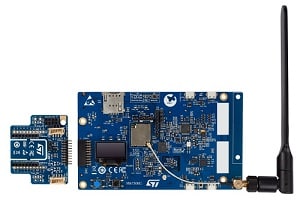Suitable for cellular IoT connectivity, the kit consumes low-power, offers remote SIM provisioning and security against cyber-attacks
 As the number of IoT devices increase, the development of power-conscious Cellular IoT devices is therefore needed to conserve energy. For this, STMicroelectronics has introduced the B-L462E-CELL1 Discovery kit, which includes a GSMA-certified embedded SIM (eSIM). The kit connects to the Internet through LTE-Cat M and NB-IoT networks, and well suited for embedded developers and IoT evangelists, and affordable for OEM and mass-market customers.
As the number of IoT devices increase, the development of power-conscious Cellular IoT devices is therefore needed to conserve energy. For this, STMicroelectronics has introduced the B-L462E-CELL1 Discovery kit, which includes a GSMA-certified embedded SIM (eSIM). The kit connects to the Internet through LTE-Cat M and NB-IoT networks, and well suited for embedded developers and IoT evangelists, and affordable for OEM and mass-market customers.
The kit features Murata’s ultra-small size all-in-one cellular module, which embeds ST’s ultra-low-power STM32L462 microcontroller, ST4SIM-200M GSMA-certified embedded SIM (eSIM) and an LTE-M/NB-IoT chipset. The eSIM comes pre-programmed with a bootstrap connectivity profile from Truphone, an ST partner.
The B-L462E-CELL1 kit is designed to strongly resist cellular connectivity attacks, thanks to the ST4SIM-200M eSIM solution based on the proven ST33 Arm SecurCore SC300 secure element, which is CC EAL5+ and GSMA SGP.02 v3.2 certified. The ST4SIM is ready to host a Root-of-Trust applet for enhanced protection against cyber-attacks.
Leveraging out-of-the-box data connectivity, the B-L462E-CELL1 enables remote SIM provisioning and SIM Over-The-Air updates. The user can immediately start the board by connecting to a power supply using a USB cable or inserting three AAA batteries in the connector provided before activating the eSIM to let the board connect to a cellular network and begin developing the application.
A set of onboard sensors, comprising of LSM303AGR accelerometer-magnetometer, HTS221 relative humidity and temperature sensor, and LPS22HH pressure sensor simplify the development of motion- and environmental monitoring solutions. A 0.96-inch OLED display, indicator LEDs and a USB connection are also present.
The STM32Cube software expansion package, X-CUBE-CELLULAR drives the Discovery kit and supports the Berkeley (BSD) sockets application programming interface (API). BSD’s standardised function-calls for Internet communication let users connect their prototypes to the Internet without needing to develop an AT-command driver to control the modem. X-CUBE-CELLULAR includes a demonstration application and cellular framework in source code, and is easily imported and configured using the powerful, free STM32Cube software toolset.
With ST’s ultra-low-power technologies in the STM32L4, which draws about 2µA in STOP 2 mode, and a cellular chipset drawing less than 1.4µA in Power Saving Mode (PSM), the B-L462E-CELL1 Discovery kit provides a platform to develop equipment with a battery life of up to 10-years for smart-city, smart-industry, smart-agriculture, smart-metering and wearable applications.
“Cellular connectivity will take a significant share on the IoT market,” said Hakim Jaafar, Head of Wireless MCU Marketing, STMicroelectronics. “For the best out-of-the-box experience, a free-of-charge LTE-M connectivity data plan allows IoT Cellular Discovery kit users to quickly develop and prototype their solutions.”
“By collaborating, we (have) developed a solution that addresses two of the major pain points cellular IoT device developers face – software development and cellular certification. This module also delivers class-leading optimisation and flexibility in a highly integrated package to enable global connectivity,” added Yong Fang, Cellular IoT Product Manager, Murata Americas.”
The B-L462E-CELL1 Discovery kit is available now.






